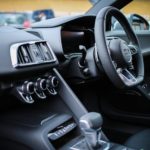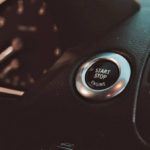Quick Navigation
When your brakes are in good condition, the vehicle stops safely without any annoying squeaking noise. Brake Squeak is a vibration that makes a noise due to metal-on-metal contact.
If brakes produce noise, you may need to grease the brake pads or replace brake rotors to stop brakes from squeaking without taking the tire off.

Fixing brakes from squeaking doesn’t always require a professional.
But, sometimes, you need a simple adjustment to fix the problems that cause brakes squeaking.
Brake squeaking can occur with new or old brakes, so the sound doesn’t mean brake replacement.
Let’s find out why your brakes squeak and how to stop them from squeaking without taking the tire off.
What Causes Car Brakes To Squeak?
Identifying the spot within the brake that may need attention helps understand why brakes squeak before taking anything apart.
Metal wear, lack of lubrication, or rough rotor surface are the standard culprits that cause brakes to squeak.
The cheap parts and improper installation can lead to squeaky brakes troubles.
For example, an inadequately lubricated caliper stick encloses the brake pads and pistons that create friction with the rotors and slow down the wheels.
In addition, a sticking caliper can decrease braking capacity and drag the car against the rotor. Ultimately, the brake pad wears down and makes noise.
The lack of lubrication between the drum and shoes causes brake squeaking. However, you can fix squeaking drum brakes quickly, just like brake greasing.
The metallic pads or dampness can cause brakes to squeak. The new brake pads also squeak because of a foreign object.
In addition, the brakes pads create heat when applying friction to slow down a car. If your brakes squeak, consider the following factors to stop brakes from squeaking.
Worn Brake Pads
Suppose an old vehicle makes a squeaking sound while braking; it may be because the brake pads are beginning to wear out.
Metal pads make the squeaking noise within worn brake pads, giving you an alarm before the entire wear down causes damage to the brake rotor.
Sometimes constant brake squeaking shifts into scraping, which could be fixed by replacing rotors and brake pads.
Sometimes, thinning worn brake pads cause a loud shrill; it is essential to replace them.
In addition, the worn brake pads can scratch the rotors down, causing them to distort or crack.
It’s most helpful to replace the brake pads to stop brakes from squeaking and further rotor damage.
Rusty Brake Rotor
Over time, a car’s rotors become rusted, causing squeaking noise. Suppose you face the same problem with your vehicle; your local mechanic can file off the rust and grime.
Dust on the surface of brake pads or rotors may cause brakes to squeak. In this case, a quick cleaner spray or sanding usually covers the problem.
For example, check to ensure your vehicle didn’t pick up trash from the road if you realize brake squeaking.
Usually, you need to clean the brake pad and rotor surface. However, brakes cause friction between the pads and rotors to wipe away the debris and junk.
Moisture
Sometimes the car makes noise when exposed to rain or moisture.
However, a thin rust coating can quickly build on the rotors when water moves into car brakes, causing squeaking noise.
It would be helpful to park a car indoors to protect brakes from moisture and brake squeaking.
Spray silicone on brakes to stop brakes from squeaking without taking the tire off.

Hard Braking
Sometimes brake squeaking becomes unavoidable.
For example, hard braking provokes brake pads to wear down and causes heat to fudge brake rotors and discs, which cause brakes to start squeaking.
The cheap brake pads contain high metal content, which causes brake squeaking.
In addition, large metal splinters in the brake material cause the brake to squeak when the metal lugs across the rotors.
When you notice brakes squeaking, it is sure that your car needs service. However, when a car’s brakes aren’t functioning correctly, the risks can be severe.
So consult a professional to stop brakes from squeaking and repair brakes if required.
How To Stop Brakes From Squeaking Without Taking The Tire Off?
Upgrading brake pads is the best way to stop brakes from squeaking.
In addition, it would be helpful to consult vehicle mechanics for other aftermarket parts that can reduce noise.
The anaerobic adhesives bond metal, but it needs to remove and scour the brake pad and caliper.
Try this technique if you can comfortably reassemble the brake parts. The metallic pads or dampness can cause brakes to squeak.
The brake squeaking noise may be due to rust on the rotors.
A layer of rust appears when dampness accumulates on the surface of the rotor, making a high-pitched squeaking.
Grease The Brake Pads To Stop Brakes From Squeaking
If new brakes squeak, greasing the contact points can prevent brake squeaking quickly.
First, you need to remove the brake pads from the calipers and lay brake grease on all the contact points.
Next, the backside of the brake pad and contact points on the caliper needs greasing. Remember, the rotor and brake pad friction surface must stay grease-free.
Install A Set Of Shims To Stop Brakes From Squeaking
The brake pad shims provide additional resistance against brake squeaking.
Depending on the vehicle, the brake pads may have shims already fitted to prevent brakes from squeaking.
Shims have a rubber coating to absorb oscillations that cause brake squeaking.
Replace The Brake Rotors To Stop Brakes From Squeaking
The worn brake rotors cause the brakes to squeak. It would help replace the brake pads and rotors to stop brakes from squeaking.
The worn brake pads and rotors are simple to identify as the rotor surface contains prominent trenches or outer lip with less than 3/8 friction material.
The calipers compress the brake pads against the brake rotors when pressing on the brake causes friction and slows the car down.
In addition, the brake pads are smaller than the rotors, which causes brake squeaking under pressure.
After understanding the common reasons for squeaky brakes, the fix could be simple: applying grease or needing a complete brake job but following a professional’s recommendation.
Take all safety precautions if trying any repairs to stop brakes from squeaking.
Fixing Squeaking Brakes Without Taking The Tire Off – Conclusion
If you catch that brakes make noise occasionally, it might be due to dust, moisture, or debris adhered between the brake pad and rotor.
The Squeaky brakes may have different causes, from humidity to severe brake hydraulics or caliper problems.
If you don’t want more brake squeaking troubles, get your car inspected by a mechanic. Otherwise, a minor brake squeaking could be a significantly more costly repair.
The brake squeaking becomes more annoying than anything and always does not indicate a failing brake system.
However, choose quality, less assertive brake pads for your vehicle to stop brakes from squeaking.
Again it’s worth citing that an expert mechanic can directly address severe brake troubles.

With comprehensive experience in writing exceptional quality articles and blogs about cars and related stuff, Daniel is one of the finest bloggers and a hardcore car lover we have. He is an ASE certified technician with an across-the-board experience of 10 years in the industry. He could not help tinkering with anything he got his hands on from a young age, which led to his remarkable career in the automotive repair industry.
When he is not under any hood, you can find him on the water or in the woods to pursue his passion for hunting and fishing. He has been writing for multiple sectors and is a regular contributor to several publications.
He currently owns a Nissan 300ZX TT and a Pearl Yellow but plans to upgrade it to 550 HP. His favorites include the Koenigsegg CCX and Lamborghini Diablo 6.0 VT, but for him, the Ferrari 360 Spider is one of the sexiest cars that exists to date.
Being an avid world traveler, he has spent most of his time analyzing the automotive markets, latest technology, and local favorites to enhance his knowledge base. He is currently living in North Caroline, where it’s all about food and coffee and, of course, cars.



![How to Check Car Tire Wear [Best Metods] How to Check Car Tire Wear [Best Metods]](https://carsupercare.com/wp-content/uploads/2023/01/Check-Tire-Wear-3-150x150.jpg)


